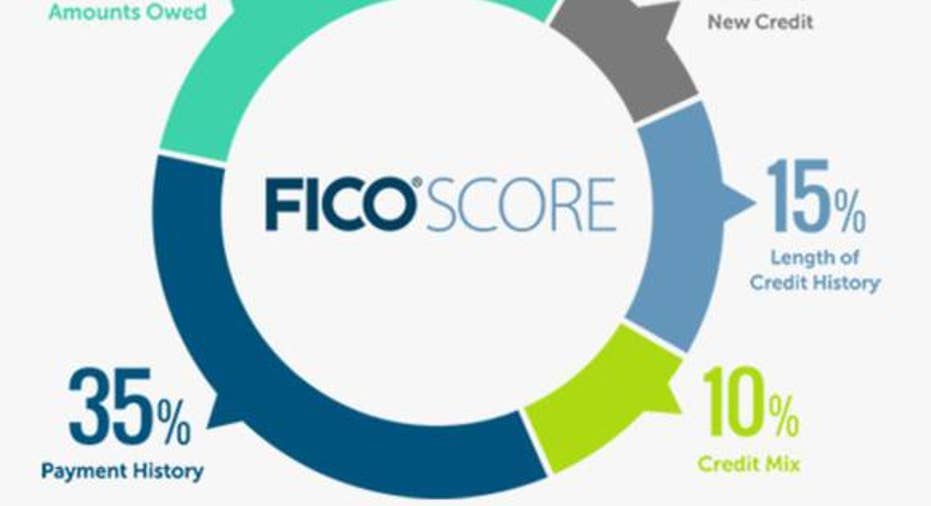Does a Bad Credit Score Really Matter?

Image source: Fair Isaac Corporation.
A credit score is used by lenders to evaluate a potential borrower's credit-worthiness, and if a credit score isn't up to snuff, it could result in a borrower paying tens of thousands of dollars in extra interest that could otherwise be invested or saved for retirement.
A credit what?A credit score is a number calculated by evaluating a person's credit history. A number of companies, including Equifax (NYSE: EFX) create these scores, but Fair Isaac's (NYSE: FICO) FICO score is the gold standard that's used by most lenders to decide whether or not to loan someone money, and how much to charge that person in interest.
The exact method used by Fair Isaac to calculate its FICO score is a trade secret, but scores range between 300 and 850, and research indicates that it's crafted by evaluating the following parts of a person's credit history:
- Payment history
- Amounts owed
- New credit
- Length of credit history
- Credit mix
Although the percentage of the overall score that each one of those variables accounts for varies from person to person based on a variety of reasons, including how long a person has had credit, 65% of the score, on average, is made up by payment history and the amount of debt owed relative to credit limits, or credit utilization.
Image source: Fair Isaac Corporation.
Why a good credit score is importantLenders use a credit score to improve the odds that they'll get their money back, and because so much of a credit score is based on a person's track record of paying bills on time and their indebtedness, a high credit score is confidence-inspiring.
In fact, a high credit score is so confidence-inspiring that lenders will compete to lend money to these borrowers, and according to Fair Isaac, that competition can significantly fatten a borrower's bank account.
Currently, a person with a credit score north of 750 will pay 3.65% per year in interest on a $200,000 30-year home loan, or $915 per month, according to Fair Isaac. Over 30 years, that borrower will pay $129,411 in interest on that loan. However, if the borrower's credit score is below 640, they'll pay 5.24% in annual interest, $1,103 per month, and a whopping $197,141 in total interest over the 30-year period. That's a $67,730 difference!
A high score can save borrowers thousands of dollars on auto loans, too.
Based on current interest rates, a borrower with a credit score north of 720 would pay 3.283% in interest annually on a 5-year, $20,000 auto loan, and the buyer would pay $1,714 in total interest over the loan period. However, a borrower with a credit score south of 589 would pay 14.758% in annual interest, or $8,396 in total interest over the five-year period. That's $6,682 more than a person with a high credit score would pay.
Boosting your credit scoreIf your credit score isn't top shelf, there are some specific actions you can take to get it there.
First, look through your payment history for mistakes. If you find an error, contact the lender to fix it. (Tip: If you only missed one payment, a lender may be willing to do a good-will adjustment and remove it from your credit report.)
Secondly, consider the percentage of money you owe on your credit cards relative to your credit limit. Ideally, you should owe 30% or less on these accounts, both altogether and individually. If your utilization is higher than that amount, accelerate payments to accounts with the highest balances, or consider transferring some of the balance to a card with a small balance. (Tip: Make sure the transfer doesn't boost utilization on the other card over 30%.)
Finally, resist the urge to open new accounts all at once. Often, retailers will offer special deals and discounts on their store-branded credit cards to get you to sign up. If you sign up for too many of them at once, it could ding your score. (Tip: If you have a lot of these cards already, keep them at a zero balance, but don't close these accounts. The length of your credit history and your payment history could be negatively affected if you do.)
The article Does a Bad Credit Score Really Matter? originally appeared on Fool.com.
Todd Campbell has no position in any stocks mentioned. Todd owns E.B. Capital Markets, LLC. E.B. Capital's clients may have positions in the companies mentioned. The Motley Fool has no position in any of the stocks mentioned. Try any of our Foolish newsletter services free for 30 days. We Fools may not all hold the same opinions, but we all believe that considering a diverse range of insights makes us better investors. The Motley Fool has a disclosure policy.
Copyright 1995 - 2015 The Motley Fool, LLC. All rights reserved. The Motley Fool has a disclosure policy.



















